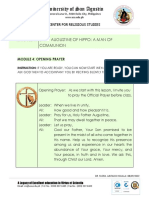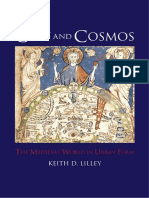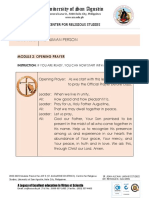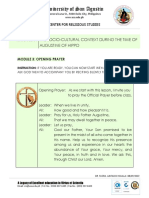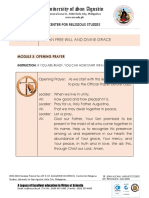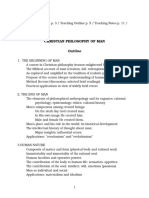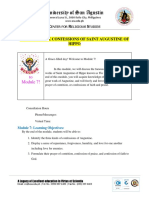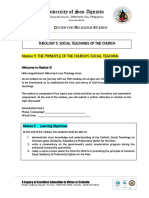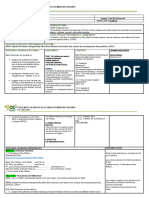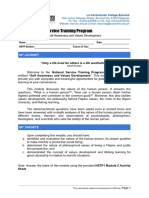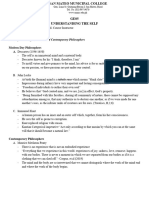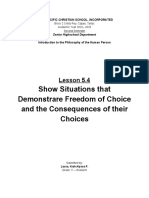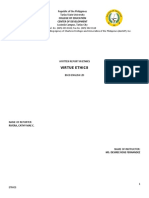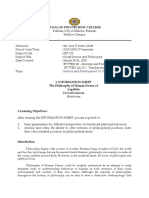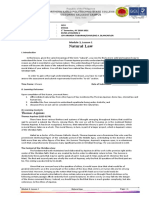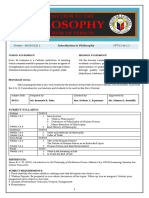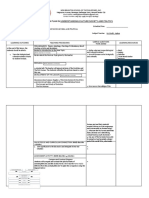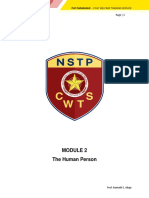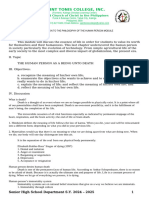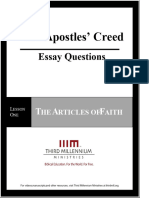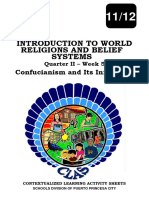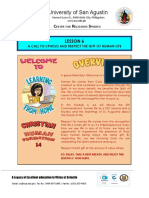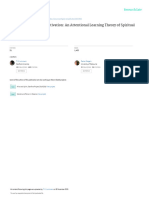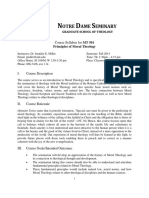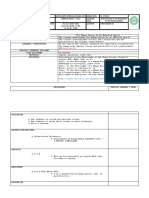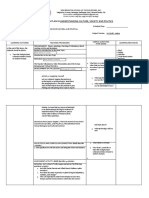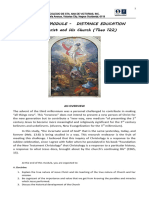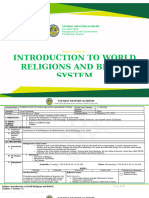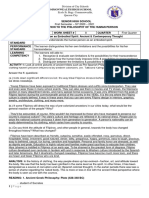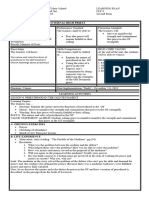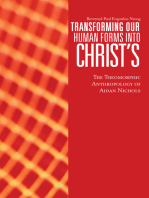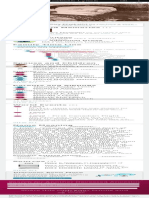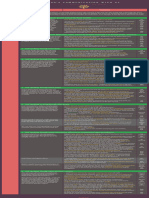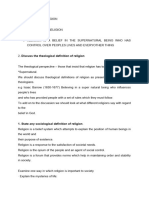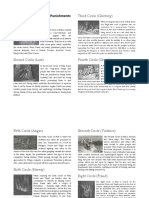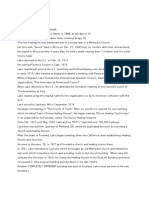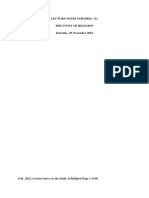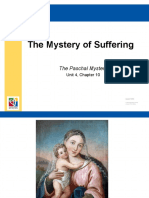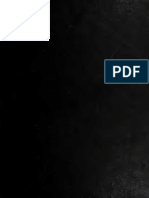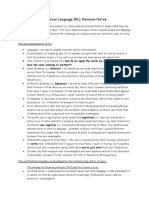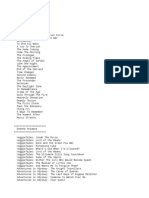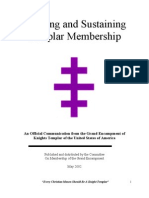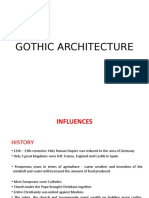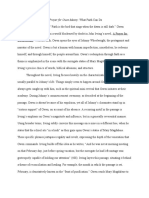THEO - 4 - Moral Theology
THEO - 4 - Moral Theology
Uploaded by
Azariah EribalCopyright:
Available Formats
THEO - 4 - Moral Theology
THEO - 4 - Moral Theology
Uploaded by
Azariah EribalOriginal Description:
Original Title
Copyright
Available Formats
Share this document
Did you find this document useful?
Is this content inappropriate?
Copyright:
Available Formats
THEO - 4 - Moral Theology
THEO - 4 - Moral Theology
Uploaded by
Azariah EribalCopyright:
Available Formats
University of San Agustin
General Luna St., 5000 Iloilo City, Philippines
www.usa.edu.ph
CENTER FOR RELIGIOUS STUDIES
THEOLOGY 4: MORAL THEOLOGY
Module 2: THE HUMAN PERSON
Timeframe: 2nd Week, 6 hours
I. OVERVIEW
Welcome to Module 2, The Human Person.
This module provides four topics that would
help us reflect, illustrate, and analyze the
Christian perspectives of being a human person
– agent of moral life, person in experience,
called to be holy and desired to be happy,
responsibly free, and act spontaneously,
accordingly, and expressively based on one’s
own consent, intellect, and will.
Email: crs@usa.edu.ph | Tel. No.: 0999-997-1485 | Fax No.: (033) 337-4403
University of San Agustin
General Luna St., 5000 Iloilo City, Philippines
www.usa.edu.ph
CENTER FOR RELIGIOUS STUDIES
II.LEARNING OBJECTIVES
1. To reflect on how they can exercise their freedom responsibly.
2. To analyse the determinants of the morality of human acts.
3. To illustrate who the human person is, endowed with freedom which is an expression of
the divine image to fulfil his vocation to holiness.
III.COURSE CONTENT
Activity Description Time to
Complete
Opening Prayer 2 minutes
Checking of Attendance 3 minutes
Overview/Housekeeping 3 minutes
Learning Objectives 2 minutes
TLA1 Mission Impossible Asynchronous
TLA2 Discussion/ Lecture: 30 minutes
Topic 1 - HUMAN PERSON: A MORAL AGENT & PERSON
IN EXPERIENCE
TLA3 Dyad Sharing Asynchronous
AT1 Character Identification Asynchronous
TLA2 Discussion/ Lecture: 20 minutes
Topic 2: VOCATION TO HOLINESS (MAN’S DESIRE FOR
HAPPINESS)
TLA2 Discussion/ Lecture: 20 minutes
Topic 3: HUMAN FREEDOM
AT1 Poem Composition Asynchronous
TLA2 Discussion/ Lecture: 30 minutes
Email: crs@usa.edu.ph | Tel. No.: 0999-997-1485 | Fax No.: (033) 337-4403
University of San Agustin
General Luna St., 5000 Iloilo City, Philippines
www.usa.edu.ph
CENTER FOR RELIGIOUS STUDIES
Topic 4 - MORALITY OF HUMAN ACTIONS
(ACTS OF MAN AND HUMAN ACTS)
AT2 Quiz Asynchronous
Summary 3 minutes
References
Closing Prayer 2 minutes
TEACHING/LEARNING ACTIVITY 1:
MISSION IMPOSSIBLE
Time frame: 2nd Week, Asynchronous Period
Score: 10 points
Instructions: Choose only one person and makeover his/her characteristics and role as a
person, then answer the proceeding questions. Post your answer to the NEO-LMS.
Asynchronous period, score: 10 points.
Government: (president, mayor, governor)
Entertainment: (famous/influential young person)
Home: (father/ mother/sibling)
Church: (priest/pastor, etc.)
School: (teacher/student)
What skills/ attributes do you want him to develop?
How would you know that he had developed those skills?
What will you do to help him develop those skills?
Email: crs@usa.edu.ph | Tel. No.: 0999-997-1485 | Fax No.: (033) 337-4403
University of San Agustin
General Luna St., 5000 Iloilo City, Philippines
www.usa.edu.ph
CENTER FOR RELIGIOUS STUDIES
Teaching/Learning Activity 2: LECTURE/DISCUSSION
Topic 1 - HUMAN PERSON: A MORAL AGENT & PERSON IN EXPERIENCE
Timeframe: 2nd Week, 30 minutes, Synchronous Class
Topic 1 - HUMAN PERSON: A MORAL AGENT & PERSON IN EXPERIENCE
Who am I as person? Why am I here on the earth? Why do I have to die? Where does life
comes from? Is there an ultimate purpose that gives meaning to my life and even to my
suffering? These questions help us to ponder and reflect about the human person. In this topic
would help us explore the Christian perspective of being a human person. Let us explore first the
Book of Psalm (8:1-10) to acknowledge God in His divine majestic creation made manifested
uniquely given to the human dignity of the person.
READING OF THE TEXT:
Psalm 8:1-10
Divine Majesty and Human Dignity
LORD, our Lord, how majestic is your name in all the earth!
You have set your glory in the heavens.
Through the praise of children and infants you have established a stronghold against your
enemies, to silence the foe and the avenger.
When I consider your heavens, the work of your fingers,
the moon and the stars, which you have set in place,
what is mankind that you are mindful of them, human beings that you care for them?
You have made them a little lower than the angels and crowned them with glory and honor.
You made them rulers over the works of your hands; you put everything under their feet:
all flocks and herds, and the animals of the wild, the birds in the sky, and the fish in the sea,
all that swim the paths of the seas. LORD, our Lord, how majestic is your name in all the earth!
Email: crs@usa.edu.ph | Tel. No.: 0999-997-1485 | Fax No.: (033) 337-4403
University of San Agustin
General Luna St., 5000 Iloilo City, Philippines
www.usa.edu.ph
CENTER FOR RELIGIOUS STUDIES
Since human person is the key to moral life, it is important to understand the God-human
relationship where morality is based, and it is necessary to understand man/woman not only in
the abstract but also in the concrete way of being human person as a moral agent and person in
experience.
HUMAN PERSON: MORAL AGENT1
Christian moral life is simply the call to become
loving persons, in the fullness of life-with-others-in-
community before God, in imitation of Jesus Christ. The
key to moral life, then, is the human person, considered
in the light of both reason and faith. All human rights,
personal and social, all moral duties and responsibilities,
all virtues and moral character – all depend directly on
the answers we give to the questions:
o who am I as a person in community?
o as a disciple of Jesus Christ, in his Church?
In the words of PCP II: “How to live as Filipino
Christians in our situation of lights and shadows”?2
This “sense of the dignity of the human person
has been impressing itself more and more deeply on the
consciousness of contemporary man”3.
“The inviolable dignity of every human person. .
. is the most precious possession of an individual,
[whose] value comes not from what a person ‘has’ as much as from what a person ‘is’”4.
“Hence the pivotal point of our total presentation will be the human person, whole and entire,
body and soul, heart and conscience, mind and will”5. But just who or what is the human
person according to reason and Christian Faith?
1
Episcopal Commission on Catechesis and Catholic Education (ECCE). (1997). Catechism for Filipino Catholics.
Manila: Word & Life Publications, #682-686.
2
PCP II. (1992). Acts and Decrees of the Second Plenary Council of the Philippines. Manila: Secretariat. #35.
3
Second Vatican Council. (1965). Dignitatis Humanae, Declaration on Religious Freedom. # 1.
4
John Paul II. (1988). Christifideles Laici. #37.
5
Second Vatican Council. (1965). Gaudium et Spes, Pastoral Constitution on the Church in the Modern World. #3.
Email: crs@usa.edu.ph | Tel. No.: 0999-997-1485 | Fax No.: (033) 337-4403
University of San Agustin
General Luna St., 5000 Iloilo City, Philippines
www.usa.edu.ph
CENTER FOR RELIGIOUS STUDIES
Persons in Christ
For Christians, the answer can only be
grounded on Jesus Christ himself.
“In Christ and through Christ, we have
acquired full awareness of our dignity, of the heights
to which we are raised, of the surpassing worth of our
own humanity, and of the meaning of our existence”6.
“For by his incarnation, the Son of God has
united himself in some fashion with every person”7.
Christ reveals how the essential dignity of all persons is grounded directly on their origin,
meaning and destiny.
1. We believe all persons are created by God in His image and likeness (cf. Gen 1:26)
through our Lord Jesus Christ, “through whom everything was made and through whom
we live” (1 Cor 8:6).
2. We believe all are redeemed by the blood of Christ (cf. Eph 1:7; Col 1:14) and are
sanctified by the indwelling Holy Spirit (cf. Rm.8:14-16; 1 Cor 6:19).
3. We believe all persons are called to be children of God (cf. 1 Jn 3:1), destined for
eternal life of blessed communion with the Father, His Risen-Incarnate Son, and their
Holy Spirit8.
But, despite their firm belief in these basic truths of
the Christian Faith, many Catholics do not realize
how these truths touch their day-to-day moral
attitudes, acts and choices. Only if these credal truths
are linked directly with the Filipinos’ experience of
themselves as persons, will they influence their moral
living.
Hence, we have to relate these Christian truths to the common experience of “being a
Filipino person.” Although we tend to take these characteristics of our own person for
granted, we nevertheless need to become more conscious of them to gain a true knowledge of
self and of our relationships to others and to God.
6
John Paul II. (1979). Redemptoris Hominis, Redeemer of Humankind. #11.
7
Second Vatican Council. (1965). Gaudium et Spes, Pastoral Constitution on the Church in the Modern World. #22.
8
Cf. Episcopal Commission on Catechesis and Catholic Education (ECCE). (1994). Catechism of the Catholic
Church. Manila: Word & Life Publications. #1692.
Email: crs@usa.edu.ph | Tel. No.: 0999-997-1485 | Fax No.: (033) 337-4403
University of San Agustin
General Luna St., 5000 Iloilo City, Philippines
www.usa.edu.ph
CENTER FOR RELIGIOUS STUDIES
HUMAN PERSON: PERSON IN EXPERIENCE9
1. Persons are open and relational by nature.
o No man is an island; we grow into our full selves as persons only in relating to others.
o We Filipinos are outstanding in this regard: it is said “Filipinos are never alone.” We
realize being a person means being by others (our conception, birth, upbringing),
being with others (our family, friends, neighbors,
business associates), and being for others (love,
service).
o This is how we have been created by God – as
social beings. This is how we have been
redeemed by Christ – as a people. This is how
the Holy Spirit works not only within but among
us as the people of God, journeying toward our common destiny in God.
2. Persons are conscious beings, aware of themselves in their outgoing acts.
o We possess this self-awareness through our knowing
and free willing (cf. CCC 1704-7; GS 14-17). Thus
we “image” in our small way the Creator’s infinite
knowing and loving. This is the basis for our moral
life.
3. Persons are embodied spirits.
o This stresses the unity between our “body and soul.”
Our bodies are an essential part of our being human,
not merely an “instrument” we “use” according to
our whims. Contrary to those who look down on the
body, and make it the source of all evil, Christian
Faith regards the body as “good and honorable since
God has created it and will raise it up on the last day”
(GS 14).
o Moreover, God the Son further dignified the body
through his Incarnation – “The Word became flesh
and dwelt among us” (Jn 1:14). And St. Paul
admonishes us: “You must know that your body is a
temple of the Holy Spirit, who is within – the Spirit you have received from God. So,
9
Episcopal Commission on Catechesis and Catholic Education (ECCE). (1997). Catechism for Filipino Catholics.
Manila: Word & Life Publications, #687-692.
Email: crs@usa.edu.ph | Tel. No.: 0999-997-1485 | Fax No.: (033) 337-4403
University of San Agustin
General Luna St., 5000 Iloilo City, Philippines
www.usa.edu.ph
CENTER FOR RELIGIOUS STUDIES
glorify God in your body” (1 Cor 6:19-20). All our relationships with others and with
God are expressed through our bodies, which are the “natural sacrament” of our
spiritual depth.
4. Persons are historical realities.
o We are pilgrims on-the-way, who gradually, through time, become our full selves. In
exercising freedom, we decide for ourselves and form ourselves; in this sense we are
our own cause.
o We develop as persons in discernible stages, described in great detail by modern
psychology.
o Salvation history narrated in the Bible shows the dynamic interplay between good and
evil, success and failure, within
the lives of the great biblical
figures. It recounts how God
progressively brought His Chosen
People to a clearer understanding,
and higher moral vision, of their
own being and of God Himself.
5. Persons are unique, yet fundamentally equal.
o Despite physical differences as well as differing intellectual and moral powers, we
instinctively realize that as persons, in some
basic way, we are all equal.
o This is what our Faith explains: “All men are
endowed with a rational soul and are created in
God’s image; they have the same nature and
origin and, being redeemed by Christ, they
enjoy the same divine calling and destiny; there
is here a basic equality between all men” (GS
29).
o Yet, each of us is called to “image” God in a
unique way __ no one can “take our place,” as
it were. To each of us Christ says: “Fear not, for
I have redeemed you; I have called you by
name: you are mine” (Is 43:1). Thus, within the
fundamental equality of all persons, we
recognize the unique identity of each person.
This fundamental equality of all individual persons also grounds the participation and
solidarity of all peoples.
Email: crs@usa.edu.ph | Tel. No.: 0999-997-1485 | Fax No.: (033) 337-4403
University of San Agustin
General Luna St., 5000 Iloilo City, Philippines
www.usa.edu.ph
CENTER FOR RELIGIOUS STUDIES
“Since God, the Father is the origin and purpose of all people, we are all called to be
brothers. Therefore, if we have been summoned by the same destiny, which is both human
and divine, we can and should work together to build up the world in genuine peace” (GS
92).
TEACHING/LEARNING ACTIVITY 3:
DYAD SHARING
Time frame: 2nd Week, Asynchronous Period
Score: 10 points
Dyad Sharing:
Instruction: Find a partner, share and
answer the questions below. Post the
summary of your sharing in the NEO-LMS.
Asynchronous period. Score: 10 points.
What makes you happy? List down
three important things/ persons that
make you feel fulfilled in life or give
you sense of fulfillment.
What is real happiness?
Email: crs@usa.edu.ph | Tel. No.: 0999-997-1485 | Fax No.: (033) 337-4403
University of San Agustin
General Luna St., 5000 Iloilo City, Philippines
www.usa.edu.ph
CENTER FOR RELIGIOUS STUDIES
Teaching/Learning Activity 2: LECTURE/DISCUSSION
Topic 2 - VOCATION TO HOLINESS (MAN’S DESIRE FOR HAPPINESS)
Timeframe: 2nd Week, 20 minutes, Synchronous Class
Topic 2: VOCATION TO HOLINESS (MAN’S DESIRE FOR HAPPINESS)
READING OF THE TEXT:
“O God, You are my God; I shall seek You earnestly;
My soul thirsts for You, my flesh yearns for You,
In a dry and weary land where there is no water.”
Psalm 63:1
The universal call to holiness is imparted to the baptized person whose life received the
holiness of God who alone is holy. What is this holiness, how it is done and how it is live today
matter to the person where life awaits to search, discover, discern, and respond to the particular
vocation and plan God prepared for his/her life.
VOCATION TO HOLINESS: WHAT IT IS?10
The book of Psalm 63 begins with the words of praise: “O God, You are my God; I shall
seek You earnestly; My soul thirsts for You, my flesh yearns for You, In
a dry and weary land where there is no water.” This is the cry of every
human person. However, God is not always where people look for
answers and happiness. Sometimes we can reconstruct this verse to say,
“O, you are my God; I shall seek you…” Even though we may place
other things higher than we place our Lord, we are always trying to satiate
that emptiness we can sometimes feel. St. Augustine speaks of God
saying, “You move us to delight in praising You; for You have formed us
for Yourself, and our hearts are restless till they find rest in You” (The
Confessions, 1.1). How true this is. It is God who we serve, and it is God in whom we will find
our happiness. This is not just what the Church says. It is what our hearts tell us:
10
Cf. http://www.usccb.org/beliefs-and-teachings/vocations/educators-and-youth-leaders/lesson-
plans/upload/lesson-plan-universal-call-holiness.pdf. Retrieved on Dec. 31, 2019. pages 13-15.
Email: crs@usa.edu.ph | Tel. No.: 0999-997-1485 | Fax No.: (033) 337-4403
University of San Agustin
General Luna St., 5000 Iloilo City, Philippines
www.usa.edu.ph
CENTER FOR RELIGIOUS STUDIES
“It is Jesus that you seek when you dream of happiness; He is waiting for you when nothing
else you find satisfies you; He is the beauty to which you are so attracted; it is He who provoked
you with that thirst for fullness that will not let you settle for compromise; it is He who urges you
to shed the masks of a false life; it is He who reads in your heart your most genuine choices, the
choices that others try to stifle. It is Jesus who stirs in you the desire to do something great with
your lives, the will to follow an ideal, the refusal to allow yourselves to be ground down by
mediocrity, the courage to commit yourselves humbly and patiently to improving yourselves and
society, making the world more human and more fraternal.”11
All of us has a vocation. God is calling each of us—individually and personally, generally,
and specially. Generally, all of us is call to holiness. You have a call from God. It is,
specifically your call. It is your vocation.
We all have a vocation, a calling from God. The Second Vatican Council reminds of our
general call to holiness – be it ordained ministry, religious life, married
life, and widow. Your vocation may be to be a mom or a dad. You
may be called to the single life. You may be called to be a doctor, a
teacher, a salesperson, or an office worker all for the greater glory of
God. Yes, God may call you into a career through which you are made
holier and He is glorified. This represents what the Church calls the
“universal call to holiness” that we all share. The Second Vatican
Council tells us that, “everyone [in the Church] whether belonging to
the hierarchy, or being cared for by it, is called to holiness, according
to the saying of the Apostle [St. Paul]: ‘For this is the will of God, your sanctification’ (1
Th.4:3).”12
The Scriptures tell us here that our holiness is God’s concern. He wants to fill our emptiness
as desperately as we seek to have it filled. It is our call to make this holiness of the Church
manifest in the world through our perfection of love. Jesus tells his disciples, “be you therefore
perfect, even as your heavenly Father is perfect (Mt. 5:48).”
What is holiness? Being like God! “Thus, it is evident to everyone, that all the faithful of
Christ of whatever rank or status, are called to the fullness of the Christian life and to the
perfection of charity; by this holiness as such a more human manner of living is promoted in
this earthly society.”13
11
Cf. Pope John Paul II (2000). Address Message to the World Youth Day.
12
Cf. Vatican Council II (1965). Lumen Gentium. # 39-42.
13
Cf. Episcopal Commission on Catechesis and Catholic Education (ECCE). (1994). Catechism of the Catholic
Church. Manila: Word & Life Publications. #2012-2016.
Email: crs@usa.edu.ph | Tel. No.: 0999-997-1485 | Fax No.: (033) 337-4403
University of San Agustin
General Luna St., 5000 Iloilo City, Philippines
www.usa.edu.ph
CENTER FOR RELIGIOUS STUDIES
VOCATION TO HOLINESS: HOW IT IS DONE?14
We live out our lives in this world. This is not
profound, though it is often overlooked. Your
life, my life, our neighbors’ lives are lived
together and in society. Through our holy living,
we can promote a better society. Now, we may
not be accustomed to running around giving of
ourselves and spreading holiness like a St. Francis
and other saints had, but we can train and do
something to be holier. How?
“This training in holiness calls for a Christian life distinguished above all in the art of prayer.
We have to learn to pray as it were learning this art ever anew from the lips of the Divine Master
himself, like the first disciples: ‘Lord, teach us to pray! (Lk.11:1)’ Prayer develops that
conversation with Christ which makes us his intimate friends: ‘Abide in me and I in you (Jn.
15:4)’.”15 Prayer life is one of the foundational elements of holiness and of knowing God. It is
essential to be able to love Him and to serve Him. It is the first step in answering the universal
call to holiness.16
As the Christian life develops, a deeper and more intimate relationship emerges between the
individual and the Holy Trinity. As this relationship deepens, new experiences will occur. In
any friendship, the longer two people are friends, the stronger and more cherished the friendship
becomes. An intimate knowledge develops between the two persons, which is unique to their
relationship. This is similar to our relationship between our Lord and us. As we continue to
pursue Him, He continues to deepen our hearts and strengthen our wills. Jesus calls each of us,
“not because of their works, but according to His own purpose and grace.” We are made holy by
God and in our, “Baptism of faith [we] truly become sons of God and sharers in the divine
nature. In this way [we] are really made holy.” Because of this grace, we are made like God—
we become an image of the Trinity. In this way, Christ shows us that the way to discipleship is
in prayer and in the cooperation with His grace in our lives. We can become disciples of our
Lord in the world—to live out our Baptismal calling of holiness in society and change the world
in which we live.17
14
Cf. http://www.usccb.org/beliefs-and-teachings/vocations/educators-and-youth-leaders/lesson-
plans/upload/lesson-plan-universal-call-holiness.pdf. Retrieved on Dec. 31, 2019. pages 15-16.
15
John Paul II. (2001). Novo Millennio Ineunte. #32.
16
Cf. Episcopal Commission on Catechesis and Catholic Education (ECCE). (1994). Catechism of the Catholic
Church. Manila: Word & Life Publications. #2014.
17
Cf. Vatican Council II. (1965). Lumen Gentium. # 40.
Email: crs@usa.edu.ph | Tel. No.: 0999-997-1485 | Fax No.: (033) 337-4403
University of San Agustin
General Luna St., 5000 Iloilo City, Philippines
www.usa.edu.ph
CENTER FOR RELIGIOUS STUDIES
VOCATION TO HOLINESS: HOW IT IS LIVE?18
God chooses to cleanse us of our depravity and to fill up the empty cistern of our hearts with
the living water of His grace. The place where this happens most often is within the Sacraments;
more specifically at Baptism. It is “in the waters of Baptism [that] we have been ‘washed …
sanctified…justified in the name of the Lord Jesus Christ and in the Spirit of our God
(1Co.6:11).”19
Now that you have been cleansed and baptized into Christ, how do you sustain this new life
of Grace?
Go to the Eucharist. The Eucharist is
the Body, Blood, Soul, and Divinity of
our Lord Jesus Christ. It is the
representation of our Savior’s sacrifice on
the cross, and the “source and summit of
Christian life”20 from which all graces
flow. It is the food that sustains us in our
quest for holiness and the source of our
strength. Its benefit to our Christian life
of prayer and holiness is invaluable. It is God.21
The other Sacraments will lead us to a life of
holiness. These Sacraments sustain our soul and
preserve our call to holiness.
Reconciliation helps to renew our faith and
love in Christ after we have used something
else to satisfy our longing and need for God.
Confirmation strengthens the gift of Grace we received at Baptism.
Anointing of the Sick brings us closer to our Lord in our most corporeally desperate
moments and gives us the grace to persevere.
18
Cf. http://www.usccb.org/beliefs-and-teachings/vocations/educators-and-youth-leaders/lesson-
plans/upload/lesson-plan-universal-call-holiness.pdf. Retrieved on Dec. 31, 2019. pages 16-17.
19
Cf. Episcopal Commission on Catechesis and Catholic Education (ECCE). (1994). Catechism of the Catholic
Church. Manila: Word & Life Publications. #2813.
20
Ibid., 1324.
21
Cf. Vatican Council II. (1965). Gaudium et Spes. # 24.
Email: crs@usa.edu.ph | Tel. No.: 0999-997-1485 | Fax No.: (033) 337-4403
University of San Agustin
General Luna St., 5000 Iloilo City, Philippines
www.usa.edu.ph
CENTER FOR RELIGIOUS STUDIES
The final two Sacraments come with vocations: Marriage and Holy Orders. In these two
particular vocations, people are called not only to give of themselves, but also to
completely make themselves a self-gift. If you are called to one of these vocations (and
most of us are), your pursuit of holiness takes on a new direction, as you no longer live
only for yourself, but for another. A man who desires to be holy prays and works for the
Lord. Once he is ordained a priest, his calling is to give of himself for the sake of the
Church, the Mystical Body of Christ. Through this sacrifice the priest is made holier. A
couple that enters into marriage does so by vowing to love—to sacrifice for—the other.
They are required to make themselves a self-gift for the sake of their spouse in order to
lead them to holiness. In doing this, they satisfy their vocation—their call to be holy.
The Holy Mother Church teaches at the Second Vatican Council that someone “cannot fully
find himself except through a sincere gift of himself.”22 This is why we are called by our Lord
to give. To repeat the words of St. John Paul II, “It is Jesus that you seek when you dream of
happiness; He is waiting for you when nothing else you find satisfies you; He is the beauty to
which you are so attracted; it is He who provoked you with that thirst for fullness that will not
let you settle for compromise; it is He who urges you to shed the masks of a false life; it is He
who reads in your heart your most genuine choices, the choices that others try to stifle.”23 It is
Jesus who is calling you to be holy because it is with him you will find the most joy in this world
and the next.
Teaching/Learning Activity 2: LECTURE/DISCUSSION
Topic 3 – HUMAN FREEDOM
Timeframe: 2nd Week, 20 minutes, Synchronous Class
Topic 3: HUMAN FREEDOM
Freedom is a most abused and misused word. How easily young people use the word without
really knowing the reality the word carries. This topic gives us a chance to reflect on the meaning
of freedom and how it is basically related to our human becoming.
22
Cf. Vatican Council II. (1965). Gaudium et Spes. # 24.
23
Cf. Pope John Paul II. (2000). Address Message to the World Youth Day.
Email: crs@usa.edu.ph | Tel. No.: 0999-997-1485 | Fax No.: (033) 337-4403
University of San Agustin
General Luna St., 5000 Iloilo City, Philippines
www.usa.edu.ph
CENTER FOR RELIGIOUS STUDIES
READING OF THE TEXT:
“Then you will know the truth, and the truth
will set you free”
John 8:32
The Church teaching us that only in freedom can man direct himself toward goodness.
Our contemporaries make much of this freedom and pursue it eagerly; and rightly to be sure.
Often however they foster it perversely as a license for doing whatever pleases them, even if it is
evil. For its part, authentic freedom is an exceptional sign of the divine image within man. For
God has willed that man remain "under the control of his own decisions," so that he can seek his
Creator spontaneously, and come freely to utter and blissful perfection through loyalty to Him.
Hence man's dignity demands that he act according to a knowing and free choice that is
personally motivated and prompted from within, not under blind internal impulse nor by mere
external pressure. Man achieves such dignity when, emancipating himself from all captivity to
passion, he pursues his goal in a spontaneous choice of what is good, and procures for himself
through effective and skillful action, apt helps to that end. Since man's freedom has been
damaged by sin, only by the aid of God's grace that man can give his actions their full and proper
relationship to God. Before the judgment seat of God an account of his own life will be rendered
to each one according as he has done either good or evil.24
What freedom is NOT?
Freedom is not simply doing what I
want.
Freedom is not right to say and do no
anything anytime I like to do it.
Freedom is not my own private
individual possession.
Freedom is not found in prejudice,
deceit, or ignorance.
Freedom is not without authority, law, or norm.
24
Cf. Vatican Council II. (1965). Gaudium et Spes. # 17.
Email: crs@usa.edu.ph | Tel. No.: 0999-997-1485 | Fax No.: (033) 337-4403
University of San Agustin
General Luna St., 5000 Iloilo City, Philippines
www.usa.edu.ph
CENTER FOR RELIGIOUS STUDIES
What is freedom?
“Freedom is the power, rooted in reason and will, to act or
not to act, to do this or that, and so to perform deliberate
actions on one's own responsibility. By free will one shapes
one's own life. Human freedom is a force for growth and
maturity in truth and goodness; it attains its perfection when
directed toward God, our beatitude”25
“The more one does what is good, the freer one becomes,
there is no true freedom except in the service of what is good
and just. The choice to disobey and do evil is an abuse of freedom and leads to “the slavery of
sin.”26
Human freedom is the
basis of all moral acts.
Human freedom is a
necessary condition in any
moral act without which we
cannot do anything
morally. Thus, all moral
acts whether good or sinful
are free acts. Most often,
we think of freedom as “to do what I want.” But freedom is not “the right to say and do
anything.” Authentic freedom means “to do good.”27 It is not my own individual private
possession but a shared freedom with others in the community28 (CFC, 694).
Vatican II emphasizes that “in the use of all freedoms, the moral principle of personal and
social responsibility is to be observed. In the exercise of their moral rights, individual men and
social groups are bound by the moral law to have respect both for the rights of others and for
their own duties towards others and for the common welfare of all.”29
25
Cf. Episcopal Commission on Catechesis and Catholic Education (ECCE). (1994). Catechism of the Catholic
Church. Manila: Word & Life Publications. #1731.
26
Cf. Ibid., CCC. (1994). #1733.
27
Ibid., CCC. (1994). #1740.
28
Episcopal Commission on Catechesis and Catholic Education (ECCE). (1997). Catechism for Filipino Catholics.
Manila: Word & Life Publications, #694.
29
Vatican Council II (1965). Dignitatis Humanae, Declaration on Religious Freedom. #7.
Email: crs@usa.edu.ph | Tel. No.: 0999-997-1485 | Fax No.: (033) 337-4403
University of San Agustin
General Luna St., 5000 Iloilo City, Philippines
www.usa.edu.ph
CENTER FOR RELIGIOUS STUDIES
Since we live in a community, our freedom carries with it the corresponding obligation to
respect the freedom of others. We are free as members of a community and responsible before
them for our free actions.
Examples:
If I stay up late with my radio turned on at a high volume, I rob others of their sleep and
deprive them of their freedom to rest.
If I dispose the garbage anywhere, I deprive others of the freedom to enjoy a clean and
healthy surrounding.
If after using a public toilet I willfully and knowingly leave it dirty, then I deprive the next
user of her right to a comfortable and healthful use of the facility.
Freedom is exercised in relation to others. Every person has the right to be recognized as a
free and responsible human being. We owe to one another this duty of respect.30
Hence, freedom is not my own private possession but a shared freedom with others in the
community.31 Therefore, I must experience it responsibly; that is with due regard for the
dignity and freedom of others. My moral obligation towards them guides me to the true
freedom – to do good.
Freedom is gift. I am given free will to act according to my choice, but at the same time, it is
also a responsibility. I am responsible for my acts before others and before God. “For all of us
must appear before Christ, to be judged by Him. Each one will receive what he deserves,
according to everything he has done, good or bad in his bodily life” (2 Co 5:10).
“Our dignity as persons lies in the fact that we are endowed with reason and free will
therefore privileged to bear personal responsibility”32
Human freedom can refer to:
a) the capacity for self-determination
Freedom is basically the capacity for self-
determination, or the capacity to realize one’s
own person, involving the exercise of
intellect and free will.
30
Cf. Episcopal Commission on Catechesis and Catholic Education (ECCE). (1994). Catechism of the Catholic
Church. Manila: Word & Life Publications. #1738.
31
Episcopal Commission on Catechesis and Catholic Education (ECCE). (1997). Catechism for Filipino Catholics.
Manila: Word & Life Publications, #694.
32
Vatican Council II. (1965). Dignitatis Humanae, Declaration on Religious Freedom. #2.
Email: crs@usa.edu.ph | Tel. No.: 0999-997-1485 | Fax No.: (033) 337-4403
University of San Agustin
General Luna St., 5000 Iloilo City, Philippines
www.usa.edu.ph
CENTER FOR RELIGIOUS STUDIES
Authentic freedom means sharing the capacity with others in the community,
choosing the good, because it is good for one’s true self.33
b) The context
Freedom can also refer to the context the person is in, that is he finds himself in a set
of circumstances in which a number of options are open to him, no one’s freedom
exist apart from a particular context.
c) The choice itself – actualized freedom
Freedom can refer to the act of choice itself: the experience free choosing this or that
object. It is only in the exercise of one’s freedom that one assures it; by non-exercise
one runs the risk of losing it.34
We experience freedom most naturally in our free choices to act or not to act, to do or
not to do something.35
d) the self- formed by the three – fundamental orientation
Besides our individual free acts there is the freedom of our very self-formed gradually
by our free acts called “fundamental freedom or option” it is not primarily a
psychological term but refers to our “moral being” as a human person.36
Though we say “what I am is a result of my free choices” we must also say “my
free choices flow from who I am.” Constant selfish act leads to becoming a selfish
person.
Authentic freedom is not “the right to say and do anything,” but to “do what is good”37. It is
not my own individual private possession, but a shared freedom with others in community. It is
not found in prejudice, deceit, or ignorance, but in truth. Christ’s said: “the truth will set you
free” (Jn. 8:32), truth as the condition for authentic freedom.
Authentic freedom involves first of all freedom from everything that opposes our true self-
becoming with others in community. Authentic freedom is an exceptional sign of the divine
image within man. “Lovers of true freedom [are those] who come to decisions on their own
33
Episcopal Commission on Catechesis and Catholic Education (ECCE). (1997). Catechism for Filipino Catholics.
Manila: Word & Life Publications, #720.
34
Ibid., CFC. (1997). #697.
35
Ibid., CFC. (1997). #721.
36
Ibid., CFC. (1997). #71.
37
Cf. Episcopal Commission on Catechesis and Catholic Education (ECCE). (1994). Catechism of the Catholic
Church. Manila: Word & Life Publications. #1740.
Email: crs@usa.edu.ph | Tel. No.: 0999-997-1485 | Fax No.: (033) 337-4403
University of San Agustin
General Luna St., 5000 Iloilo City, Philippines
www.usa.edu.ph
CENTER FOR RELIGIOUS STUDIES
judgment and in the light of truth, and govern their activities with a sense of responsibility,
striving after what is true and right.”38
The pillars of this freedom39 are:
The truth about Jesus the Savior
the truth about the Church and,
the truth about man and his dignity
Characteristics of Freedom40
A. Freedom From is a deliverance from
anything and everything that hinders us from becoming the true self that we are as we grow
with others in community. However, it is not a “freedom from” which will result in selfish
inclinations or blind prejudices.
Obstacle to Authentic freedom:
1) Interior obstacles are ignorance, or our disordered passions, fears, personality defects,
bad habits, prejudices, or psychological disturbances.
a. Passion is a movement of the sensitive appetite that incline us to act or not to act in
regard to something felt or imagined to be good or evil. Passions can be obstacles to
freedom when they are not controlled by reason.
b. Fear is the shrinking back of the mind on account of an impending evil.
c. Violence is a compulsive influence brought to bear upon one against his will by some
extrinsic agent.
d. Habit is defined as a facility and readiness of acting in a certain manner acquired by
repeated acts.
2) Exterior forces are violence force or even the threat of violence, economic instability,
social pressures, political or social influences, etc.
Sources that commonly traced our impediments to Authentic Freedom:
38
Episcopal Commission on Catechesis and Catholic Education (ECCE). (1997). Catechism for Filipino Catholics.
Manila: Word & Life Publications, #696.
39
Ibid., CFC. (1997). #694.
40
Ibid., CFC. (1997). # 695-699.
Email: crs@usa.edu.ph | Tel. No.: 0999-997-1485 | Fax No.: (033) 337-4403
University of San Agustin
General Luna St., 5000 Iloilo City, Philippines
www.usa.edu.ph
CENTER FOR RELIGIOUS STUDIES
a. Biological which includes inherited handicaps and
defects as well as external substances like drugs;
b. Psychological or interior compulsion including
those originating in the unconscious;
c. Social pressures such as the many economic,
political, and cultural obstacles which impede the
right to freedom.41
These three factors diminish our freedom and thus moral immutability and our
responsibility. But the greatest single obstacle to authentic freedom is SIN. Liberation to
true freedom means “first and foremost liberation from the radical slavery of sin.
B. Freedom For
After freeing us from anything and everything that hinders our growth towards maturity in
our faith, we are directed to the freedom for growing as wholly person and as children of God
sharing the divine life in Christ through the Spirit. It is both a task and a process. (Gal 5:16-
17, 24-25I).
41
Cf. Episcopal Commission on Catechesis and Catholic Education (ECCE). (1994). Catechism of the Catholic
Church. Manila: Word & Life Publications. #1740.
Email: crs@usa.edu.ph | Tel. No.: 0999-997-1485 | Fax No.: (033) 337-4403
University of San Agustin
General Luna St., 5000 Iloilo City, Philippines
www.usa.edu.ph
CENTER FOR RELIGIOUS STUDIES
C. Freedom of the Children of God
The perfection of our freedom is a task
we need to undergo at the same time a life-
long process that challenges our creativity.
The goal of this process and task is “to be
free from slavery to corruption and share in
the religious freedom of the children of
God” (Rom8:21). At Baptism Christ has
empowered us to conquer sin and recover
the meaning of our freedom through the
Holy Spirit indwelling in us. Thus, it is the power of the Holy Spirit within us that liberates
us from sin, for a life of loving service to our fellowmen (Rom 6:22-23).
Christian Freedom and Responsibility
Freedom without responsibility, without norms, without respect for authority, and without the
spirit of obedience may leave us more apt to experience abuse and hopelessness. We are limited.
Our limitations limit our exercise of freedom. Yet despite these limitations we are aware that it
is our freedom of decision and choice that we specify an act as our own, that is, we knowingly
accept responsibility not only for the action itself, but also for the perceived consequences that
may flow from it.
What is responsibility?
Responsibility is being fully accountable for
my actions. When I am accountable, I claim as
the source and the cause of what happening. I
answer for whatever consequences that may flow
from my actions.
How do we exercise our freedom responsibly?
As Christians, we come to know what is moral good in the light of the Gospel and human
experience. “For faith throws a new light on everything and manifests God’s design for our
total vocation, and thus directs the mind to solution that are fully human”42.
42
Cf. Vatican Council II. (1965). Gaudium et Spes. # 11.
Email: crs@usa.edu.ph | Tel. No.: 0999-997-1485 | Fax No.: (033) 337-4403
University of San Agustin
General Luna St., 5000 Iloilo City, Philippines
www.usa.edu.ph
CENTER FOR RELIGIOUS STUDIES
This “new light” regarding our moral life works through our conscience, “the most secret
core and sanctuary of a man, where he is alone with God, whose voice echoes in his depths”43.
Moral conscience is the expression of the divine law, defining what is good and what is evil. It
impels us to do the good and to avoid evil. It judges our behavior, approving what is good,
condemning what is evil” (cf. Rom 1:32)44. Thus, it is our conscience that indicates for us how,
in our daily thoughts, words and deeds; we are to love God and our neighbor.
Social Dimension of Freedom
Freedom is exercised in relationships between human beings. Every human person, created in
the image of God, has the natural right to be recognized as a free and responsible being. All owe
to each other this duty of respect. The right to the exercise of freedom, especially in moral and
religious matters, is an inalienable requirement of the dignity of the human person. This right
must be recognized and protected by civil authority within the limits of the common good and
public order.45
Assessment Task 1: POEM COMPOSITION “Who Am I?”
Instructions:
a. Compose a poem about “Who am I” as
a person and post in NEO-LMS during
the asynchronous period.
b. Rubrics: Total Score = 20 points
Writing Process/Effort = 4 pts.
Title = 4 pts.
Neatness = 4 pts
Style = 4 pts
Vocabulary = 4 pts
Timeframe: 2nd Week
43
Cf. Ibid., GS (1965). #16.
44
Cf. Episcopal Commission on Catechesis and Catholic Education (ECCE). (1994). Catechism of the Catholic
Church. Manila: Word & Life Publications. #1778.
45
Cf. Ibid., CCC. (1994). # 1738.
Email: crs@usa.edu.ph | Tel. No.: 0999-997-1485 | Fax No.: (033) 337-4403
University of San Agustin
General Luna St., 5000 Iloilo City, Philippines
www.usa.edu.ph
CENTER FOR RELIGIOUS STUDIES
Teaching/Learning Activity 2: LECTURE/DISCUSSION
Topic 4 - HUMAN PERSON: A MORAL AGENT & PERSON IN EXPERIENCE
Timeframe: 2nd Week, 30 minutes, Synchronous Class
Topic 4: MORALITY OF HUMAN ACTIONS (ACTS OF MAN AND HUMAN ACTS
For each situation, determine whether the action is right, neutral, or wrong; whether the intent
is good or not good; and whether the circumstances allow you to decide freely or keep you from
deciding freely. Let us explore Romans 12:9-20 as a reflective text to our next topic about the
morality of human actions which shapes man his own being as a person and determines his
conducts through his actions.
READING OF THE TEXT: Romans 12:9-20
9 Love must be sincere. Hate what is evil; cling to what is good. 10 Be devoted to one another in
love. Honor one another above yourselves.11 Never be lacking in zeal, but keep your spiritual
fervor, serving the Lord. 12 Be joyful in hope, patient in affliction, faithful in prayer.13 Share with
the Lord’s people who are in need. Practice hospitality.
14 Bless those who persecute you; bless and do not curse. 15 Rejoice with those who rejoice;
mourn with those who mourn. 16 Live in harmony with one another. Do not be proud, but be
willing to associate with people of low position.[a] Do not be conceited.17 Do not repay anyone
evil for evil. Be careful to do what is right in the eyes of everyone. 18 If it is possible, as far as it
depends on you, live at peace with everyone. 19 Do not take revenge, my dear friends, but leave
room for God’s wrath, for it is written: “It is mine to avenge; I will repay,”[b] says the Lord. 20 On
the contrary: “If your enemy is hungry, feed him; if he is thirsty, give him something to drink. In
doing this, you will heap burning coals on his head.”[c]
Freedom makes man a moral subject. When he acts deliberately, man is, so to speak, the father
of his acts. Human acts, that is, acts that are freely chosen in consequence of a judgment of
conscience, can be morally evaluated. They are either good or evil.46
46
Episcopal Commission on Catechesis and Catholic Education (ECCE). (1994). Catechism of the Catholic Church.
Manila: Word & Life Publications. #1749.
Email: crs@usa.edu.ph | Tel. No.: 0999-997-1485 | Fax No.: (033) 337-4403
University of San Agustin
General Luna St., 5000 Iloilo City, Philippines
www.usa.edu.ph
CENTER FOR RELIGIOUS STUDIES
CONCEPT AND NATURE OF HUMAN ACTS47:
1) Human Acts (actus humanus)
They are actions that proceed from insight into the nature and purpose of one’s doing
and from the content of free will.48
A human act is any thought, word, deed, desire, or omission which comes from a
person acting with full knowledge of what he/she is doing, who is free to act or to
refrain from action, and who gives
full assent to his/her will to act.
The examples are acts of thinking,
loving, reading books, studying,
praying, and reciting in class.
2) Acts of Man (actus hominis)
Other acts performed by a person without full knowledge, freedom, and choice are
simply called acts of man.
They are performed without intervention of intellect
and freewill.
They comprise all spontaneous biological and sensual
processes, like nutrition, such as breathing, sensual
impressions; all performed without the use of reason
by people such as lunatics, the drunk, and those who
are asleep.
These are the spontaneous reactions which precede
the activity of the intellect and will, like first reactions of anger, and sympathy.
It distinguished from human acts by the force acts which, though affected with some
insight and cooperation of the intellect, are carried out against one’s personal decision
and will.49
Acts of man are indeliberate, involuntary, not free, not under one’s control, and
beyond the mind and the will.
THE SOURCES OF THE MORALITY OF HUMAN ACTS50:
47
Cf. Esteban T. Salibay, Jr.(2013). Christian Morality in Contemporary Society: A Worksheet and Textbook for
College Students, Revised Edition. Quezon City: C & E Publishing Inc., 30.
48
Karl H. Peschke. (1988). Christian Ethics. Vol.1. Manila: Logos Publications. 247.
49
Ibid., Peschke. (1988). 247.
50
Ibid., CCC. (1994). #1750-1754.
Email: crs@usa.edu.ph | Tel. No.: 0999-997-1485 | Fax No.: (033) 337-4403
University of San Agustin
General Luna St., 5000 Iloilo City, Philippines
www.usa.edu.ph
CENTER FOR RELIGIOUS STUDIES
The morality of human acts depends on:
1) The Object Chosen
The object chosen is a good toward which the will
deliberately directs itself. It is the matter of a human act.
The object chosen morally specifies the act of the will,
insofar as reason recognizes and judges it to be or not to
be in conformity with the true good. Objective norms of
morality express the rational order of good and evil,
attested to by conscience.
2) The End in View or the Intention
The intention resides in the acting subject. Because it lies at the voluntary source of
an action and determines it by its end, intention is an element essential to the moral
evaluation of an action.
The end is the first goal of the intention and indicates the purpose pursued in the
action. The intention is a movement of the will toward the end: it is concerned with
the goal of the activity. It aims at the good anticipated from the action undertaken.
Intention is not limited to directing individual actions but can guide several actions
toward one and the same purpose; it can orient one's whole life toward its ultimate
end.
For
example, a service done
with the end of helping
one's neighbor can at
the same time be
inspired by the love of
God as the ultimate end
of all our actions. One
and the same action can
also be inspired by
several intentions, such as performing a service in order to obtain a favor or to boast
about it.
A good intention (for example, that of helping one's neighbor) does not make
behavior that is intrinsically disordered, such as lying and calumny, good or just. The
end does not justify the means. Thus, the condemnation of an innocent person cannot
be justified as a legitimate means of saving the nation. On the other hand, an added
bad intention (such as vainglory) makes an act evil that, in and of itself, can be good
(such as almsgiving). (Mt. 6:2-4)
Email: crs@usa.edu.ph | Tel. No.: 0999-997-1485 | Fax No.: (033) 337-4403
University of San Agustin
General Luna St., 5000 Iloilo City, Philippines
www.usa.edu.ph
CENTER FOR RELIGIOUS STUDIES
3) The Circumstances of the Action
The circumstances, including the consequences, are secondary elements of a moral
act. They contribute to increasing or diminishing the
moral goodness or evil of human acts (for example,
the amount of a theft). They can also diminish or
increase the agent's responsibility (such as acting out
of a fear of death). Circumstances of themselves
cannot change the moral quality of acts themselves;
they can make neither good nor right an action that is
in itself evil.
Kinds of Circumstances:
a. Mitigating is the circumstances that diminish or lessen the moral culpability of the
moral agent.
b. Aggravating is the circumstances that add to or increase the degree of the agent’s
moral responsibility
Example: To use obscene language is sinful; to do so in front of children adds the
sin of scandal. Circumstances may make a mortal sin out of a venial sin.
CONSTITUENT PRINCIPLES OF HUMAN ACTS51
1) Knowledge
The will can decide for something and seek it only if it is first known. Thus, the essential
conditions for a human act include knowledge of the aspired object, attention to the
action with which the object is to be pursued, and judgments on the value of the act.
A person cannot will without knowing what object he/she is concerned with, without
having mastered the object.
Therefore, conscious of the act, he/she performs
in order to realize the aim, without evaluating
the action in its concrete nature as a desirable
good or undesirable evil. Such appraisal also
includes the judgment on the moral value of the
act.
2) Freedom
If a person, for some reason, is not free to
choose what he/she likes according to his/her
51
Karl H. Peschke. (1988). Christian Ethics, (Vol. 1). Manila: Logos Publications. 248.
Email: crs@usa.edu.ph | Tel. No.: 0999-997-1485 | Fax No.: (033) 337-4403
University of San Agustin
General Luna St., 5000 Iloilo City, Philippines
www.usa.edu.ph
CENTER FOR RELIGIOUS STUDIES
insight and will and has to act against his/her will, his/her action is not free and
consequently not a human act.
Hence, as a second essential condition for a human act, consent of the free will is
required, which implies freedom from any external or internal compulsion.
3) Voluntariness
Note that anything that is an object of the will is called “willed” (volitum). But not
everything that is willed is necessarily an effect of the will. For example, the setting of a
house on fire which is not caused but desired by someone is something willed but it is not
the effect of the will.
When what is will is both the object and the effect of the will, we call it voluntary
(voluntarium). For example, the burning of a house which a person wills and causes is
voluntary.
In short, the voluntariness of the human act is determined by the will of the agent.
Sometimes, this is also known as the intention of the agent.
GOOD ACTS AND EVIL ACTS52
A morally good act requires the
goodness of the object, of the end,
and of the circumstances together.
An evil end corrupts the action, even
if the object is good in itself (such as
praying and fasting "in order to be
seen by men").
The object of the choice can by itself
vitiate an act in its entirety. There are
some concrete acts - such as fornication - that it is always wrong to choose, because
choosing them entails a disorder of the will, that is, a moral evil.
It is therefore an error to judge the morality of human acts by considering only the
intention that inspires them or the circumstances (environment, social pressure, duress, or
emergency, etc.) which supply their context. There are acts which, in and of themselves,
independently of circumstances and intentions, are always gravely illicit by reason of
their object; such as blasphemy and perjury, murder and adultery. One may not do evil so
that good may result from it.
52
Ibid., CCC. (1994). #1755-1756.
Email: crs@usa.edu.ph | Tel. No.: 0999-997-1485 | Fax No.: (033) 337-4403
University of San Agustin
General Luna St., 5000 Iloilo City, Philippines
www.usa.edu.ph
CENTER FOR RELIGIOUS STUDIES
PRINCIPLES FOR JUDGING THE MORALITY OF AN ACT
An act is morally good if the act itself, the purpose of the act, and the circumstances of the
act are substantially good.
If an act is intrinsically evil, the act is not morally allowable regardless of purpose or
circumstances.
For example, fornication (sexual relations between two unmarried people) is a grave sin
against chastity.)
If an act is itself morally good or at least indifferent its morality will be judged by the
purpose or the circumstances.
Circumstances may create, mitigate, or aggravate sin. They may change an indifferent act
into one that is morally sinful. Circumstances may also compound the sinfulness of an act.
(Ex: Adultery (sexual relations with a married person who is not one’s spouse) is a twofold
grave sin – violating of chastity and a violation of the marriage bond with the innocent
spouse.)
IMPEDIMENTS TO HUMAN ACTS
A. Impairment of Required Knowledge
1) Ignorance is lack of knowledge in a person
capable of knowing.
a) Invincible ignorance is that which cannot
be dispelled either because the individual is
unable to secure adequate information,
even after a reasonable effort or because he
does not know that there is any problem.
He is ignorant of his ignorance.
A person’s ignorance is considered invincible when the person is not able to
dispel it through the use of reasonable diligence, which is commensurate with the
issue of an act and with one’s opportunities. It is characterized as an antecedent
ignorance, which means it precedes any voluntary act and not willed by any
consent of the will. And since it is so, the person with an invincible ignorance is
Email: crs@usa.edu.ph | Tel. No.: 0999-997-1485 | Fax No.: (033) 337-4403
University of San Agustin
General Luna St., 5000 Iloilo City, Philippines
www.usa.edu.ph
CENTER FOR RELIGIOUS STUDIES
not culpable or morally liable for the act that proceeds or results from his
ignorance.
b) Vincible ignorance can be removed by reasonable diligence but is not
removed/dispelled because of negligence and bad will on the part of the one who
possess such an ignorance. This kind of ignorance is described as a consequent
ignorance because it is admitted or willed either directly or indirectly; thus, it is a
consequence of a previous decision of the free will. The ignorant person’s culpability
depends on the degree of the effort he/she exerted to remove the ignorance.
Invincible ignorance eliminates responsibility while vincible ignorance lessens
responsibility without actually eliminating it.
2) Inattention is when someone pays no attention to what he is doing, the action the he/she
commits is not a human act. The moral responsibility for such an act depends on the
degree of inattention that is blameworthy.
3) Error, False Opinions and False Convictions,
these result from deficient education, influence of
bad company, reading of misleading books and
papers, etc. Man is challenged to overcome errors
by seeking the truth, to escape the negative
influences of those forces that misguide him and
to reach views based on sound reason.
B. Impairment of Free Consent
1) Passion or Concupiscence refers to the sensitive, innate appetites that God has endowed
to man. They are neither destructive nor evil by nature. They only become evil and
destructive if they are not controlled by reason.
Concupiscence is the rebellion of the passions against reason; it is a tendency of
human nature towards evil.
An evil action performed in the heat of passion is different from an evil action that is
planned and calculated.
Email: crs@usa.edu.ph | Tel. No.: 0999-997-1485 | Fax No.: (033) 337-4403
University of San Agustin
General Luna St., 5000 Iloilo City, Philippines
www.usa.edu.ph
CENTER FOR RELIGIOUS STUDIES
An individual may deliberately arouse the passion say by reading obscene book or
watching pornographic movie before a date, in such a case the moral guilt is
increased rather than lessened. If the passion is spontaneous, culpability is lessened.
a) Antecedent concupiscence is the sort which precedes the act of the will and is not
willfully stimulated such as sudden anger. Antecedent Concupiscence lessens the
voluntary nature of human acts and lessens the degree of moral responsibility.
b) Consequent concupiscence that which is stimulated by the will, such as anger deliberately
encouraged. Consequent concupiscence does not lessen moral responsibility rather a
person is completely responsible for his actions.
Examples:
o A very depressed person who attempts suicide is less blameworthy because of his
emotional state.
o An employer who deliberately worked himself to a rage to intimidate a new
employee would be fully responsible for his actions.
2) Fear is an agitation or disturbance of the mind resulting from some present or imminent
danger. Fear diminishes the voluntary nature of the act. However, one distinction must be
kept in mind. Some acts are done because of fear and would not have been done if fear
had not been present. Some acts are done with fear present but would have been done
anyway.
Any acts that are done, and would have been done anyway, whether fear was present or
not, are clearly voluntary; and if they are morally wrong, the person is morally
responsible.
3) Violence is an external force applied by one person on another in order to compel him to
perform some action against his will.
Perfect
violence is when the victim
gives complete resistance.
It is done from perfect
violence is entirely
voluntary and no moral
culpability is attached.
Email: crs@usa.edu.ph | Tel. No.: 0999-997-1485 | Fax No.: (033) 337-4403
University of San Agustin
General Luna St., 5000 Iloilo City, Philippines
www.usa.edu.ph
CENTER FOR RELIGIOUS STUDIES
Imperfect if the victim offers insufficient resistance. In imperfect violence that which
is done is less voluntary and so the moral guilt is lessened but not taken away
completely.
4) Habit which is an inclination to perform some particular action; acquired by repetition
and characterized by a decreased power of resistance and increased faculty of
performance.
Habit does not destroy the voluntary nature of our acts. We are at least partially
responsible for acts done form habit as long as the habit is consciously allowed to
continue. If we take no steps to curb the habit such as resorting to prayer, sacraments,
and practices of self-denial, then we bear some moral responsibility for our habitual
actions. As long as we know the consequences of the act and do it repeatedly, we are
consciously willing that which follows.
5) Temperament is the sum total of those qualities which mark us as individual.
A person’s temperament can somewhat lessen his responsibility for certain actions.
A person who despairs easily might be more affected by temperament than someone
who is optimistic.
6) Nervous Mental Disorder may completely take away the voluntary nature of certain
actions or at least lessen their voluntary nature because the disorder affect the operation
of the intellect and will.
7) Occasion of Sin is an outside circumstance which offers a person an enticement or
invitation to sin. We are morally obliged to avoid sin.
Assessment Task 2: QUIZ
Instructions:
Answer the quiz posted in NEO-LMS during the asynchronous class
Total Score = 20 points (5 items per topic)
Timeframe: 2nd Week
IV. LEARNINIG ACTIVITIES
Email: crs@usa.edu.ph | Tel. No.: 0999-997-1485 | Fax No.: (033) 337-4403
University of San Agustin
General Luna St., 5000 Iloilo City, Philippines
www.usa.edu.ph
CENTER FOR RELIGIOUS STUDIES
Mission Impossible (see above)
o Makeover of the following persons:
Government leader: president, mayor, governor
Entertainment: influential young person
Home: father, mother, sibling
Church: priest/pastor, etc.
School: teacher, student
o What skills/ attributes do you want him to develop?
o How would you know that he had developed those skills?
o What will you do to help him develop those skills?
o Rubrics:
Rubric for Module 2 (POEM COMPOSITION), Total Highest Score = 20 points
CATEGORY Excellent Good (3 points) Satisfactory Needs Improvement
(4 points) (2 points) (1 point)
THE WRITING Student devoted a Student devoted Student Student devoted little
PROCESS / lot of time and adequate time and devoted some time and effort to the
EFFORT effort to the effort to the time and writing process. It
writing process writing process effort to the appears that the
and worked hard and worked to get writing student does not care
to make the poem the job done. The process but about the assignment.
a good read. The poem may have was not very The poem has many
poem has no one or two errors. thorough. errors.
errors. Does enough
to get by.
There are
several errors.
TITLE The poem has a The poem has a The poem has The poem has no title
title that clearly title that relates to a title
relates to the poem the poem
and adds interest
to the theme or
message of the
Email: crs@usa.edu.ph | Tel. No.: 0999-997-1485 | Fax No.: (033) 337-4403
University of San Agustin
General Luna St., 5000 Iloilo City, Philippines
www.usa.edu.ph
CENTER FOR RELIGIOUS STUDIES
poem
NEATNESS The final draft of The final draft of The final draft The final draft is not
the poem is the poem is of the poem is neat or attractive. It
readable, clean, readable, neat and readable and looks like the student
neat and attractive. attractive. It may some of the just wanted to get it
It is free of have one or two pages are done and didn’t care
erasures and erasures, but they attractive. It what it looked like.
crossed-out words. are not looks like
It looks like the distracting. It parts of it
author took great looks like the might have
pride in it. author took some been done in a
pride in it. hurry.
STYLE The poem is The poem is The poem is The poem lacks style,
written with a written with a written and the thoughts did
great sense of defined with somewhat not come out clearly
style. The poem style. Thoughts with style. on paper.
has been well are clear to read Thoughts are
thought out and and clear to a
makes sense to the understandable. degree.
reader.
VOCABULARY The poem is filled The poem The poem The poem lacks
with descriptive includes many includes some description and does
vocabulary that descriptive descriptive not allow the reader to
appeals to the elements and is words and visualize the poem.
reader. appealing. phrases.
Lecture /Discussion (see above)
Dyad Sharing (see above)
o What makes you happy? List down three important things/ persons that make you
feel fulfilled in life or give you sense of fulfillment.
o What is real happiness
Email: crs@usa.edu.ph | Tel. No.: 0999-997-1485 | Fax No.: (033) 337-4403
University of San Agustin
General Luna St., 5000 Iloilo City, Philippines
www.usa.edu.ph
CENTER FOR RELIGIOUS STUDIES
V. ASSESSMENT
Poem Composition Who Am I? (see above)
Quiz (see above)
VI. SUMMARY
Human person as a moral agent is essentially originated in his/her dignity as created by God
in his own image and likeness, redeemed by Christ, sanctified by the Holy Spirit, called children
of God and destined for eternal life. He/she is a person in experience because of his/her open and
relational by nature, conscious being, embodied spirit, historical realities, unique yet
fundamentally equal. He/she is universally called to holiness which makes his/her happy in
living the vocation God planned for him/her. He/she is born free and has a power to choose good
and avoid evil because of his responsibility in every action taken. Thus, knowing and judging the
sources of his actions determine the outcome of it and the capacity to choose good and right is
what really intended by God to his/her life and helping towards the journey of life.
VII. REFERENCES
Episcopal Commission on Catechesis and Catholic Education (ECCE). (1994). Catechism of the
Catholic Church. Manila: Word & Life Publications.
Episcopal Commission on Catechesis and Catholic Education (ECCE). (1997). Catechism for
Filipino Catholics. Manila: Word & Life Publications.
Pope John Paul II. (2000) Address Message to the World Youth Day.
John Paul II. (1988). Christifideles Laici.
John Paul II. (1988). Novo Millennio Ineunte.
John Paul II. (1979). Redemptoris Hominis, Redeemer of Humankind.
Peschke, Karl H. (1988). Christian Ethics. (Vol.1). Manila: Logos Publications.
Email: crs@usa.edu.ph | Tel. No.: 0999-997-1485 | Fax No.: (033) 337-4403
University of San Agustin
General Luna St., 5000 Iloilo City, Philippines
www.usa.edu.ph
CENTER FOR RELIGIOUS STUDIES
Salibay, Esteban T. Jr. (2013). Christian Morality in Contemporary Society: A Worksheet and
Textbook for College Students, Revised Edition. Quezon City: C & E Publishing Inc.
Second Vatican Council. (1965). Gaudium et Spes, Pastoral Constitution on the Church in the
Modern World.
Second Plenary Council of the Philippines. (1992). Acts and Decrees of the Second Plenary
Council of the Philippines. Manila: Secretariat, PCPII.
Second Vatican Council. (1965) Gaudium et Spes, Pastoral Constitution on the Church in the
Modern World.
Second Vatican Council. (1965). Dignitatis Humanae, Declaration on Religious Freedom.
Second Vatican Council. (1965). Lumen Gentium.
http://www.usccb.org/beliefs-and-teachings/vocations/educators-and-youth-leaders/lesson-
plans/upload/lesson-plan-universal-call-holiness.pdf. Retrieved on Dec. 31, 2019.
Email: crs@usa.edu.ph | Tel. No.: 0999-997-1485 | Fax No.: (033) 337-4403
You might also like
- Asf 1 Module 4 - Saint Augustine of Hippo A Man of CommunionDocument21 pagesAsf 1 Module 4 - Saint Augustine of Hippo A Man of CommunionTed Dian TejadoNo ratings yet
- Toaz - Info The Secret Language of Astrology The Illustrated Key To Unlocking The Secrets of PRDocument178 pagesToaz - Info The Secret Language of Astrology The Illustrated Key To Unlocking The Secrets of PRKid Kaito100% (16)
- Keith D. Lilley - City and Cosmos - The Medieval World in Urban Form-Reaktion Books (2009)Document258 pagesKeith D. Lilley - City and Cosmos - The Medieval World in Urban Form-Reaktion Books (2009)Caslav Nikolic100% (1)
- Challenges and Opportunities in Theological Education in The 21st Century Pointers For A New International Debate On Theological EducationDocument21 pagesChallenges and Opportunities in Theological Education in The 21st Century Pointers For A New International Debate On Theological EducationWorld Conference of Associations of Theological Institutions (WOCATI)100% (1)
- Asf 2 Module 2 I Sacred ScriptureDocument14 pagesAsf 2 Module 2 I Sacred ScriptureabelusoNo ratings yet
- Asf 3 Module 2 The Human PersonDocument26 pagesAsf 3 Module 2 The Human PersonHelloNo ratings yet
- Module 6 - Theo 5Document19 pagesModule 6 - Theo 5Claire G. MagluyanNo ratings yet
- Asf 1 Module 2 - The Ecclesial and Historical Contexts During The Time of Augustine of HippoDocument17 pagesAsf 1 Module 2 - The Ecclesial and Historical Contexts During The Time of Augustine of HippoTed Dian TejadoNo ratings yet
- Asf 1 Module 3 - The Socio-Cultural Context During The Time of Augustine of HippoDocument25 pagesAsf 1 Module 3 - The Socio-Cultural Context During The Time of Augustine of HippoTed Dian TejadoNo ratings yet
- Theology M1Document21 pagesTheology M1Axl BangcayaNo ratings yet
- Asf 1 Module 1 - Augustine S Early Childhood His Formal Education and His Teaching MinistryDocument28 pagesAsf 1 Module 1 - Augustine S Early Childhood His Formal Education and His Teaching MinistryTed Dian TejadoNo ratings yet
- CHF 14 Lesson 5Document13 pagesCHF 14 Lesson 5Andrew Theodore BalingitNo ratings yet
- Asf 3 Module 3 Human Free Will and Divine GraceDocument14 pagesAsf 3 Module 3 Human Free Will and Divine GraceHelloNo ratings yet
- Philosophy of ManDocument46 pagesPhilosophy of ManJohn Kenneth Hernandez100% (2)
- IPHP Q1 Module 4 - Freedom and MoralityDocument8 pagesIPHP Q1 Module 4 - Freedom and MoralitySpencer Marvin P. EsguerraNo ratings yet
- University of San Agustin: To Module 7!Document13 pagesUniversity of San Agustin: To Module 7!NOCHU COME THRUNo ratings yet
- University of San Agustin: To Module 8!Document10 pagesUniversity of San Agustin: To Module 8!NOCHU COME THRUNo ratings yet
- Asf 3 Module 8 Mans Ultimate End and EschatologyDocument19 pagesAsf 3 Module 8 Mans Ultimate End and EschatologyPANDANo ratings yet
- Module 5 - Theo 5Document24 pagesModule 5 - Theo 5Claire G. MagluyanNo ratings yet
- WEEK 3 LessonDocument17 pagesWEEK 3 LessonadscoNo ratings yet
- Northeast Luzon Adventist College: Senior High School DepartmentDocument8 pagesNortheast Luzon Adventist College: Senior High School DepartmentRudsan TurquezaNo ratings yet
- TLP Grade 10-Week 4Document6 pagesTLP Grade 10-Week 4Salvador BadongNo ratings yet
- Module 2Document11 pagesModule 2Ajiro ShenpeiNo ratings yet
- GE05 Week 3 4Document2 pagesGE05 Week 3 4zalduajravenNo ratings yet
- Introduction To World Religions and Belief System: Guided Learning Activity KitDocument22 pagesIntroduction To World Religions and Belief System: Guided Learning Activity KitRheaMaravillaNo ratings yet
- Show Situations That Demonstrare Freedom of Choice and The Consequences of Their ChoicesDocument3 pagesShow Situations That Demonstrare Freedom of Choice and The Consequences of Their Choiceskiah lacsaNo ratings yet
- CHF 14 Lesson 6Document15 pagesCHF 14 Lesson 6Andrew Theodore BalingitNo ratings yet
- SS4 MidtermDocument67 pagesSS4 MidtermMark Anthony LimNo ratings yet
- Virtue Ethics: College of Education Center of DevelopmentDocument6 pagesVirtue Ethics: College of Education Center of Developmentcathymae riveraNo ratings yet
- Activity 3 Social Science and Philosophy ModuleDocument5 pagesActivity 3 Social Science and Philosophy ModuleVilma Sotto100% (1)
- Asf 4 Module 5 I The Churchs Social EncyclicalsDocument13 pagesAsf 4 Module 5 I The Churchs Social EncyclicalsAlec MagcanamNo ratings yet
- Natural Law: Thomas AquinasDocument8 pagesNatural Law: Thomas Aquinascheng09No ratings yet
- Intro To Philo (Partial) Weeks 1n2Document6 pagesIntro To Philo (Partial) Weeks 1n2jhonmichael AbustanNo ratings yet
- Understanding The Self Module Ge 102Document10 pagesUnderstanding The Self Module Ge 102CLAIRE ABIGAIL BOSQUENo ratings yet
- Introduction To World Religion and Beliefs System: Calasanz de Davao Academy, IncDocument10 pagesIntroduction To World Religion and Beliefs System: Calasanz de Davao Academy, IncJuanmiguel Ocampo Dion SchpNo ratings yet
- I. Objectives: Session 1Document5 pagesI. Objectives: Session 1Giovani Trinidad VargasNo ratings yet
- Daily Lesson Plan in Understanding Culture Society and PoliticsDocument4 pagesDaily Lesson Plan in Understanding Culture Society and PoliticsRed AgbonNo ratings yet
- Le - G12 - Week-1-Introduction To World Religions and Belief Systems - DraftDocument6 pagesLe - G12 - Week-1-Introduction To World Religions and Belief Systems - DraftCgc Bryan Del PilarNo ratings yet
- Module 2 The Human PersonDocument10 pagesModule 2 The Human PersonPatrick John AvilaNo ratings yet
- IPHP Module 8Document2 pagesIPHP Module 8Mary GarciaNo ratings yet
- Essay Questions, The Apostles CreedDocument39 pagesEssay Questions, The Apostles CreedJemelyn CadungogNo ratings yet
- IntroductiontotheWorldReligion1112 - q2 - CLAS5 - CONFUCIANISM-AND ITS-INFLUENCES - Seconddraft - JOSEPH AURELLODocument10 pagesIntroductiontotheWorldReligion1112 - q2 - CLAS5 - CONFUCIANISM-AND ITS-INFLUENCES - Seconddraft - JOSEPH AURELLONoel PiedadNo ratings yet
- University of San AgustinDocument25 pagesUniversity of San AgustinJinecy Guarnes DocilidadNo ratings yet
- Introduction To The Philosophy of The Human Person (1G)Document39 pagesIntroduction To The Philosophy of The Human Person (1G)Trisha May Panaligan SacdalanNo ratings yet
- DLP 5 ConfucianismDocument3 pagesDLP 5 ConfucianismAshley Jade Hanna Flores100% (3)
- Syllabus Introduction To Philosophy-Roland ApareceDocument5 pagesSyllabus Introduction To Philosophy-Roland ApareceRoland ApareceNo ratings yet
- Module 1. ApprovedDocument20 pagesModule 1. ApprovedThursten Kaye Santos SabandalNo ratings yet
- CHF 14 Lesson 6Document15 pagesCHF 14 Lesson 6Hanz Gabriel DegomaNo ratings yet
- La Consolacion College: Prepared By: Mrs. Belinda T. Antecristo, LPT, Ma-CddsDocument17 pagesLa Consolacion College: Prepared By: Mrs. Belinda T. Antecristo, LPT, Ma-CddsJULIUS CESAR M. EREGILNo ratings yet
- Prayeras Inner Sense Cultivation An Attentional Learning Theoryof Spiritual ExperienceDocument32 pagesPrayeras Inner Sense Cultivation An Attentional Learning Theoryof Spiritual ExperienceLehaci OnisimNo ratings yet
- Moral Fundamental IDocument66 pagesMoral Fundamental IFrancisco VillanuevaNo ratings yet
- Otre AME Eminary: Course Syllabus For MT 501Document9 pagesOtre AME Eminary: Course Syllabus For MT 501Camile Santos MallariNo ratings yet
- Topic/Lesson Name The Human Person As An Embodied Spirit Content Standards Performance Standards Learning CompetenciesDocument3 pagesTopic/Lesson Name The Human Person As An Embodied Spirit Content Standards Performance Standards Learning Competenciesrhiantics_kram11No ratings yet
- Daily Lesson Plan in Understanding Culture, Society and PoliticsDocument3 pagesDaily Lesson Plan in Understanding Culture, Society and PoliticsRed AgbonNo ratings yet
- Chapter 5Document2 pagesChapter 5Richard PalaylayNo ratings yet
- DLP 3 The Human Person As An Embodied SpiritDocument2 pagesDLP 3 The Human Person As An Embodied Spiritjennieswft024No ratings yet
- COR 015 - Intro. To The Philo. of The Human Person - Day01 - TGDocument7 pagesCOR 015 - Intro. To The Philo. of The Human Person - Day01 - TGjay pedocheNo ratings yet
- Theo 122 ModuleDocument10 pagesTheo 122 ModuleAntoinette dela CruzNo ratings yet
- IWRBS Q3 WK 3-4Document3 pagesIWRBS Q3 WK 3-4Alexis Mercado VargasNo ratings yet
- Philo Worksheet 8 Lardera GaussDocument6 pagesPhilo Worksheet 8 Lardera GaussZyrus Dizon MondiaNo ratings yet
- Lesson 1 in The PhilosophyDocument2 pagesLesson 1 in The PhilosophyEden GorraNo ratings yet
- Grade 8 LP6Document3 pagesGrade 8 LP6noralynbuticNo ratings yet
- Transforming Our Human Forms into Christ's: The Theomorphic Anthropology of Aidan NicholsFrom EverandTransforming Our Human Forms into Christ's: The Theomorphic Anthropology of Aidan NicholsNo ratings yet
- Spen 102Document131 pagesSpen 102Arwa AnanNo ratings yet
- Sbs - 055 - EN The-Seed-Of-GodDocument6 pagesSbs - 055 - EN The-Seed-Of-GodArnold KileoNo ratings yet
- Orthodox Christian Education A ManualDocument14 pagesOrthodox Christian Education A ManualJOBIN P SAJINo ratings yet
- Mary Elizabeth Lynch (1857-1957) - FamilySearchDocument1 pageMary Elizabeth Lynch (1857-1957) - FamilySearchRobbie PieNo ratings yet
- 2nd Sunday of Advent (A)Document100 pages2nd Sunday of Advent (A)Thadeus MendozaNo ratings yet
- Your Spiritual Weapons and How - Terry LawDocument64 pagesYour Spiritual Weapons and How - Terry LawBasilio MaliwangaNo ratings yet
- God's Communication 11 Ways He (Might) Communicate With UsDocument3 pagesGod's Communication 11 Ways He (Might) Communicate With UsThomas Lorenz (Fit For Faith Ministries)No ratings yet
- Book of EnochDocument22 pagesBook of EnochUnai GomezNo ratings yet
- Iloilo Museum of The Contemporary Arts (Ilomoca)Document2 pagesIloilo Museum of The Contemporary Arts (Ilomoca)Kyle Miguel De mesaNo ratings yet
- Religious Education BGCSE MR orDocument79 pagesReligious Education BGCSE MR orletlotlomazongo8No ratings yet
- 9 Circles of Hell and Its Punishments: Third Circle (Gluttony)Document3 pages9 Circles of Hell and Its Punishments: Third Circle (Gluttony)Kaye EusebioNo ratings yet
- Who Was John G. Lake?Document3 pagesWho Was John G. Lake?Daniel AbrahamNo ratings yet
- Greek Catholic Church of Croatia and SerbiaDocument3 pagesGreek Catholic Church of Croatia and Serbianovascotta343No ratings yet
- THE ABOMINATIONS IN THE SDA CHURCHDocument14 pagesTHE ABOMINATIONS IN THE SDA CHURCHMildred MunachoongaNo ratings yet
- Ang Kagandahan NG Pag-IbigDocument8 pagesAng Kagandahan NG Pag-IbigElexis Castillo100% (1)
- Erel 111 The Study of ReligionDocument68 pagesErel 111 The Study of ReligionOdock KizitoNo ratings yet
- The Mystery of SufferingDocument17 pagesThe Mystery of SufferingsaintmaryspressNo ratings yet
- The Holy Bible (1803) PDFDocument1,084 pagesThe Holy Bible (1803) PDFgabby scott100% (2)
- Anglo Saxon Christian PoetryDocument1 pageAnglo Saxon Christian PoetrySk MirajulNo ratings yet
- A2 Philosophy Revision Notes FULLDocument47 pagesA2 Philosophy Revision Notes FULLHubert SelormeyNo ratings yet
- Filme CrestineDocument2 pagesFilme CrestineDianna TanaseNo ratings yet
- Claremont Mormon Studies: But What Exactly Do You Do?Document11 pagesClaremont Mormon Studies: But What Exactly Do You Do?rjjburrowsNo ratings yet
- KT Membership BookletDocument45 pagesKT Membership BookletSteven E Myers100% (3)
- Gothic ArchitectureDocument41 pagesGothic ArchitectureTrisha Marie Bustria MartinezNo ratings yet
- History of Ethiopia and The HornDocument40 pagesHistory of Ethiopia and The Hornnigusemihiret122No ratings yet
- Owen Meany Close ReadDocument5 pagesOwen Meany Close ReadCharlie Qian0% (1)
- Bible Study: Topic: End Time Apostasy Scripture: 2 Thessalonians 2 v. 1-3Document11 pagesBible Study: Topic: End Time Apostasy Scripture: 2 Thessalonians 2 v. 1-3Paul CampbellNo ratings yet
